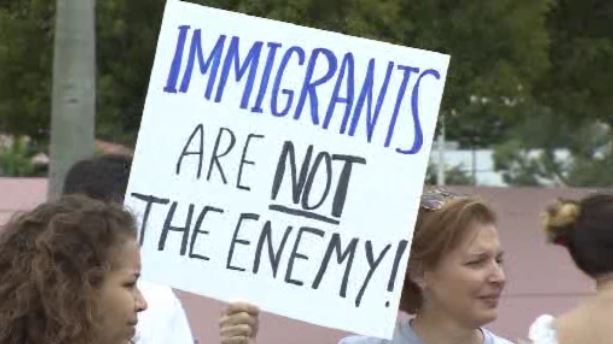PHILADELPHIA (AP) — The heart of Philadelphia’s Italian Market was uncommonly quiet. Fine restaurants in the nation’s capital and New York closed for the day. Grocery stores, food trucks, coffee shops and taco joints in places like Chicago, Los Angeles and Boston shut down.
Immigrants around the U.S. stayed home from work and school Thursday to demonstrate how important they are to America’s economy and way of life, and many businesses closed in solidarity, in a nationwide protest called A Day Without Immigrants.
The boycott was aimed squarely at President Donald Trump’s efforts to crack down on immigration, legal and illegal, by such means as a wall at the Mexican border. Organizers said they expected thousands to participate or otherwise show their support.
The protest even reached into the U.S. Capitol, where a Senate coffee shop was among the eateries that were closed as employees did not show up at work.
The day’s activities also included rallies in several cities.
Marcela Ardaya-Vargas, who is from Bolivia and now lives in Falls Church, Virginia, pulled her son out of school to take him to a Day Without Immigrants march in Washington.
“When he asked why he wasn’t going to school, I told him because today he was going to learn about immigration,” she said, adding: “Our job as citizens is to unite with our brothers and sisters.”
Organizers appealed to immigrants from all walks of life to take part, but the effects were felt most strongly in the restaurant industry, which has long been a first step up the economic ladder for newcomers to America with its many jobs for cooks, dishwashers and servers.
Expensive restaurants and fast-food joints alike closed across the country. Sushi bars, Brazilian steakhouses, Mexican eateries and Thai and Italian restaurants turned away lunchtime customers.
On Ninth Street in South Philadelphia’s Italian Market, it was so quiet in the morning that Rani Vasudeva thought it might be Monday, when many of the businesses on the normally bustling stretch are closed.
Produce stands and other stalls along “Calle Nueve” — as 9th Street is more commonly known for its abundance of Mexican-owned businesses — stood empty, leaving customers to look elsewhere for fresh meat, bread, fruits and vegetables.
“It’s actually very sad,” said Vasudeva, a 38-year-old professor at Temple University. “You realize the impact the immigrant community has. We need each other for our daily lives.”
Since the end of 2007, the number of foreign-born workers employed in the U.S. has climbed by nearly 3.1 million to 25.9 million; they account for 56 percent of the increase in U.S. employment over that period, according to the Labor Department.
The foreign-born — who include American citizens, green-card holders and those working without legal authorization — tend to be younger and to take jobs in fields that have been growing fastest, including restaurants, hotels and stores.
Roughly 12 million people are employed in the restaurant industry, and immigrants make up the majority — up to 70 percent in places like New York and Chicago, according to the Restaurant Opportunities Centers United, which works to improve working conditions. An estimated 1.3 million in the industry are immigrants living in the U.S. illegally, the group said.
In New Mexico, the state with the largest percentage of Hispanics, school officials said hundreds of students might stay home.
Many people who skipped work will lose a day’s pay or worse, and many student absences will not be excused. But organizers argued that the cause is worth the sacrifice.
“They are tired of their communities being criminalized,” said Olivia Vazquez, a 22-year-old community organizer with Juntos and a Mexican immigrant living in the U.S. illegally. “Every human being deserves a life with dignity and respect, and we’re not getting that. They’re ready to fight back.”
In New Orleans’ Mid-City neighborhood, whose Latino population swelled after the damage wrought by Hurricane Katrina in 2005 created lots of jobs for construction workers, the Ideal Market was closed.
The place is usually busy at midday with people lining up at the steam tables for hot lunches or picking from an array of fresh Central American vegetables and fruits.
In Chicago, Pete’s Fresh Market closed five of its 12 grocery stores and assured employees they would not be penalized for skipping the day, according to owner Vanessa Dremonas, whose Greek-immigrant father started the company.
“It’s in his DNA to help immigrants,” she said. “We’ve supported immigrants from the beginning.”
Carmen Solis, a Mexico-born U.S. citizen, took the day off from work as a project manager and brought her two children to a rally in Chicago.
“I feel like our community is going to be racially profiled and harassed,” she said of Trump’s immigration policies. “It’s very upsetting. People like to take out their anger on the immigrants, but employers are making profits off of them. ”
Tony and Marie Caschera, both 66, who were visiting Washington from Halfmoon, New York, thought a tapas restaurant looked interesting for lunch, but then realized the lights were off and the place was closed.
“I’m in support of what they’re trying to say,” said Marie Caschera, a registered Democrat, adding that immigrants are “fearful for their communities.”
Her husband, a registered Republican whose family immigrated from Italy before World War II, said he supports legal immigration, but added: “I don’t like illegal aliens here.”
Copyright 2024 The Associated Press. All rights reserved. This material may not be published, broadcast, rewritten or redistributed.

